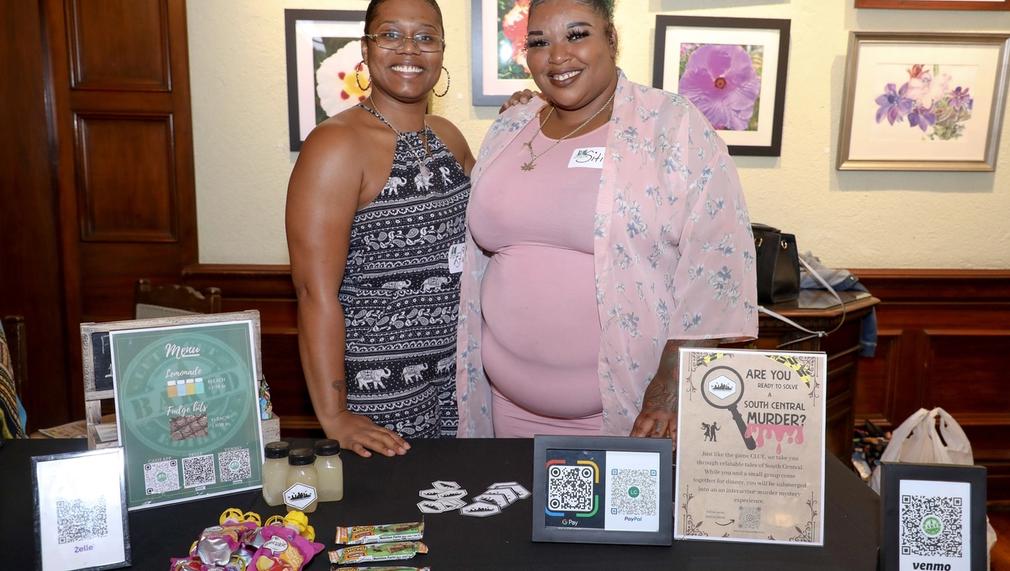Empowering Women of Color to Thrive
This project will enhance Alexandria House’s business incubator for single mothers experiencing homelessness. It provides single mothers with training, resources, and meaningful support (including childcare) to launch small businesses, increase their upward mobility, bolster their sustainability, and make tangible progress towards ending intergenerational cycles of poverty and trauma.

What is the primary issue area that your application will impact?
Income inequality
In what stage of innovation is this project, program, or initiative?
Expand existing project, program, or initiative (expanding and continuing ongoing, successful work)
What is your understanding of the issue that you are seeking to address?
We serve women – primarily women of color – and their children who are experiencing homelessness and healing from trauma. Throughout the continuum of our services – shelter, case management, training, therapy, childcare, and connection to permanent housing – we focus on supporting single mother-led families to achieve housing and financial stability.
A 2023 study by Smart Asset suggests a single resident in L.A. needs $76,710 for a comfortable lifestyle. Two things: 1) We serve women with children, and this figure doesn’t include the immense costs of having a child, and 2) this figure represents income AFTER taxes. Listening to our participants has led us to create pathways to entrepreneurship and jobs that lead to careers and livable wages. When we focus on this, we not only support economic stability but also foster well-being that comes from self-confidence, resilience, and success. We know these families. We know they need more than jobs. That’s what we’re addressing here.
Describe the project, program, or initiative this grant will support to address the issue.
Our program, 'Start-Up Sisterhood Los Angeles' (SUSLA), is a business incubator that contains the training, resources, and professional development of a traditional incubator program, but informed by the experiences of women who have survived trauma from domestic violence, human trafficking, homelessness, and yet demonstrate resiliency and resolve to provide a better life for their children.
SUSLA includes a 14-week entrepreneurial program taught by an adjunct business professor. This program provides us with quality entrepreneurial training so these mothers can launch small businesses. This past year, we had 48 participants in SUSLA Entrepreneurship Training, each graduating with a business plan, a business license, a marketing plan, and a scaling plan. Additionally, they each received $250 to use towards their business and can apply for micro-grants for start-up costs. This year, the women of SUSLA participated in 7 vendor events (farmer's markets, fairs/festivals, etc.), and we are currently supporting 14 women in creating their websites.
Out of necessity and equity, free childcare is an addition to SUSLA. As any single mother well knows, the best personal or professional development opportunity means nothing if there's nowhere for her child to safely be when she is working.
Describe how Los Angeles County will be different if your work is successful.
This program serves four cohorts of 10-15 women annually. Last year, 48 women graduated from the SUSLA program. Therefore, in the short term (one year), we prepare a minimum of 40 women to contribute to L.A. County's economy. But beyond the nuts and bolts of what small businesses contribute to our economy, isn't it overwhelmingly positive for at least 40 of those small businesses to be driven by women possessing a frame of reference to some of this county's more complex problems? Isn't it overwhelmingly positive to have at least 40 of our county's small businesses with an eye for equity and an understanding of how economic, well-being, and sustainability-based barriers can be removed for others who are struggling?
The impact of supporting women to be economically stable reverberates throughout our community. Our business community will be wiser and more involved in solutions, and our children will be raised in increasingly stable homes that celebrate success and cherish resilience.
What evidence do you have that this project, program, or initiative is or will be successful, and how will you define and measure success?
Quantitatively, we measure the success of this program by A) whether a minimum of 10 women have signed up for each of the four annual cohorts, B) whether a minimum of 80% of each cohort graduates the program, and C) whether the program graduates use the skills they've garnered to either start their own businesses or secure a more upwardly mobile position than a standard, entry-level position.
Qualitatively, we measure success by celebrating the successes of our graduates. Graduates like Sylvia, who opened a Mexican catering company. As she writes on the homepage of her website, “…recipes form as life’s good moments happen, and I gather each good time I have lived, not only as a person, but also as a daughter and above all, the great battles as a single mother.” recipes
Approximately how many people will be impacted by this project, program, or initiative?
Direct Impact: 60.0
Indirect Impact: 300.0